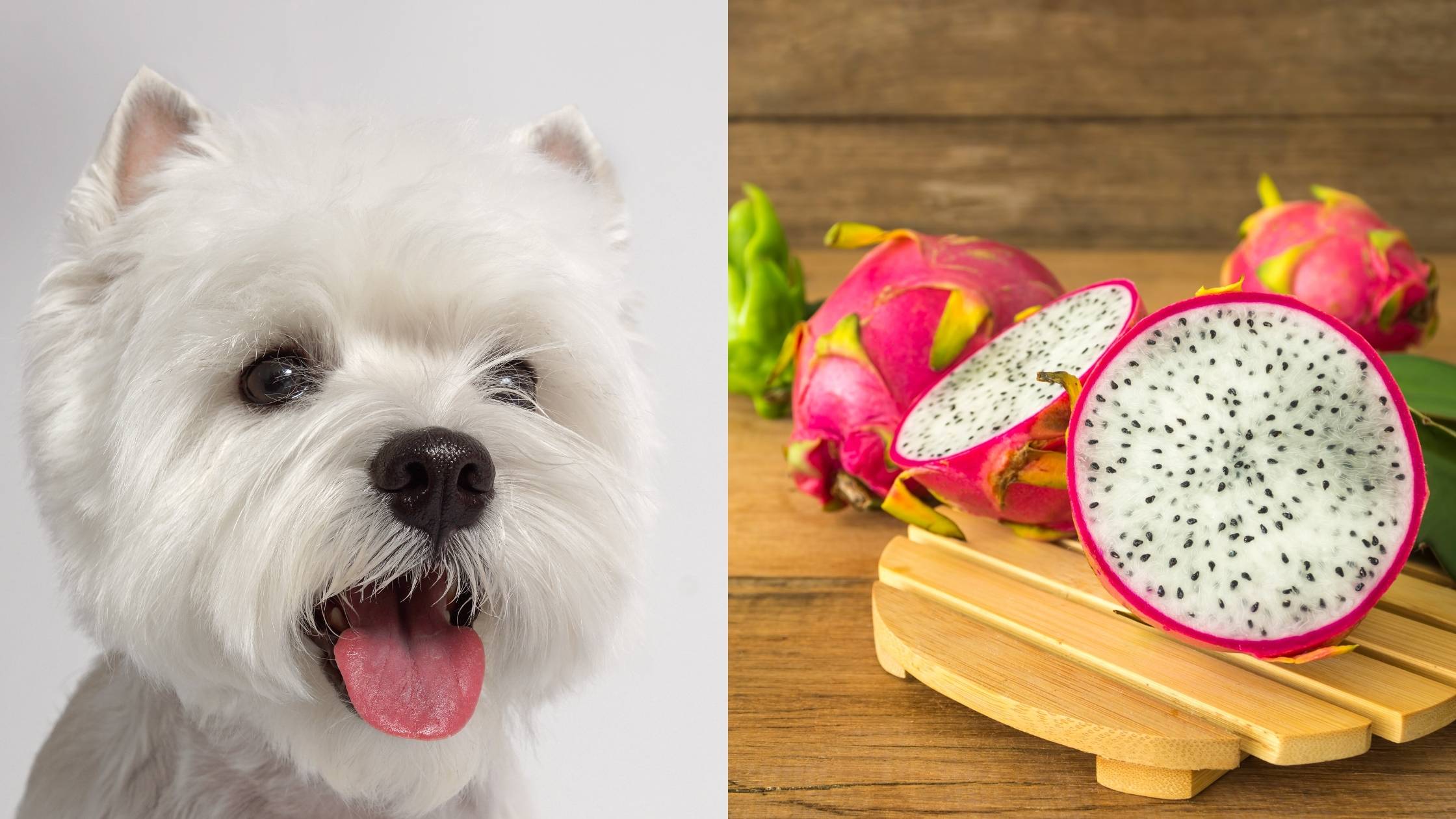Last Updated on 11/17/2021 by Veronica Jones
Dragon fruit, also known as a pitahaya or strawberry pear, is a vibrant and unusual looking tropical fruit.
The striking colors make both humans and dogs want to take a bite, but can dogs eat dragon fruit?
In this article, we find out if dogs can eat dragon fruit, whether there are any health benefits or issues with canine consumption and how to prepare it safely for your pup. Read on before sharing a bite of dragon fruit with your pup.
What is dragon fruit?
You may have seen the red exotic fruit that is known as a dragon fruit, but do you know what it is? Does the taste live up to its beauty?
This interesting fruit is believed to originate from Central America but is now shipped worldwide for people to enjoy. The taste has been described as a cross between a pear, kiwi and watermelon with a light, sweet taste.
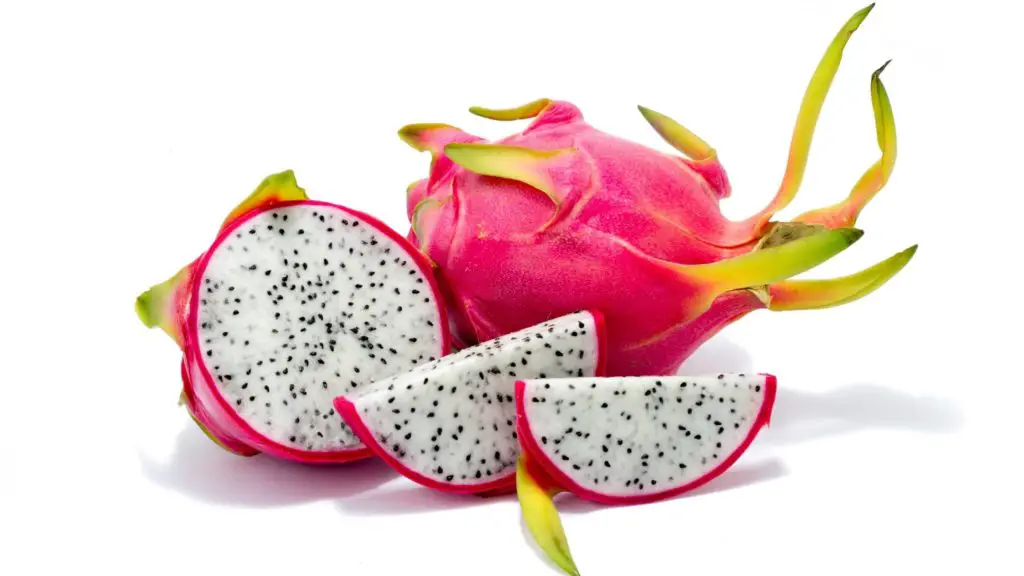
Different types of dragon fruit
All of the different variations of dragon fruit described below are safe for doggy consumption.
Pink dragon fruit – the eye-catching bright pink skin is a bright reddish-pink color with yellow leaves that grow out of the skin. The flesh is white with black seeds. This particular type of dragon fruit comes from Vietnam. Dogs can eat pink dragon fruit safely.
Purple dragon fruit – this dragon fruit looks similar to the pink variety, however the purple dragon fruit contains the antioxidant betalain and is rich in folate. Consuming this fruit will maintain a healthy digestive tract and promotes good eye health thanks to the ingredient beta carotene that it contains.
Red dragon fruit – also bursting with vitamins, minerals, potassium and fiber, the red dragon fruit has bright red flesh with small, crunchy seeds.
Yellow dragon fruit – whilst similar in appearance to the other types of dragon fruit, the skin of a yellow dragon fruit is yellow and bumpy and it has the highest levels of vitamin C.
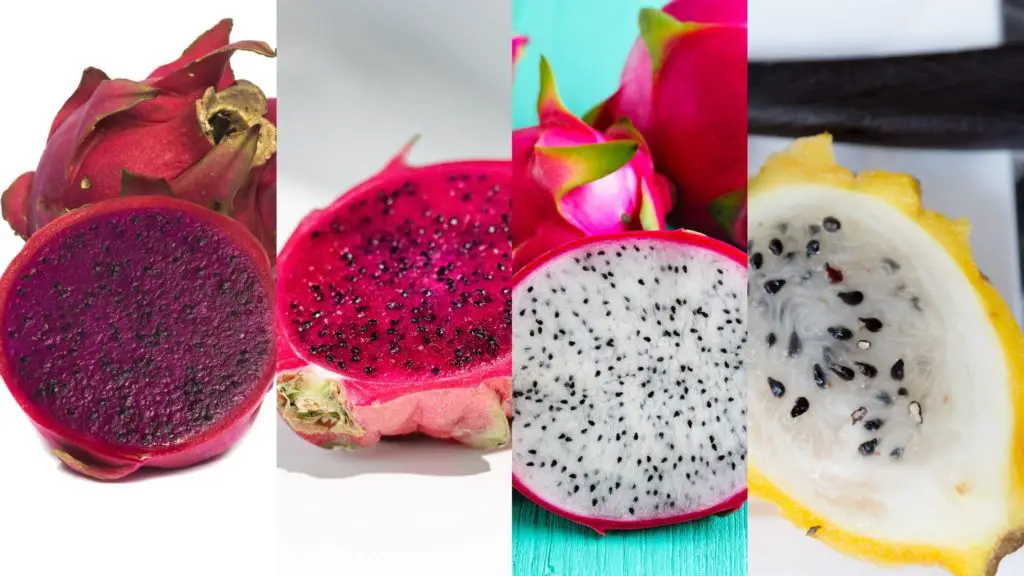
Can dogs eat dragon fruit?
Yes, dogs can safely eat dragon fruit in moderation as it’s non-toxic. Dragon fruit is bursting with vitamins, nutrients and antioxidants that provide several health benefits to canines. However, before letting your dog tuck into this sweet super fruit, it needs to be prepared properly.
What happens when a dog eats dragon fruit?
Most dogs will love eating the soft, sweet flesh of a dragon fruit. Start by giving a small piece and watch your dog’s reaction to tasting it. Most dogs like the sweet taste and soft texture, but other dogs may not want to have any more after trying it. How will you know if your dog likes dragon fruit? Wagging a tail while eating, licking their lips and pawing at your leg are signs that your pooch has enjoyed trying a dragon fruit and would like some more.
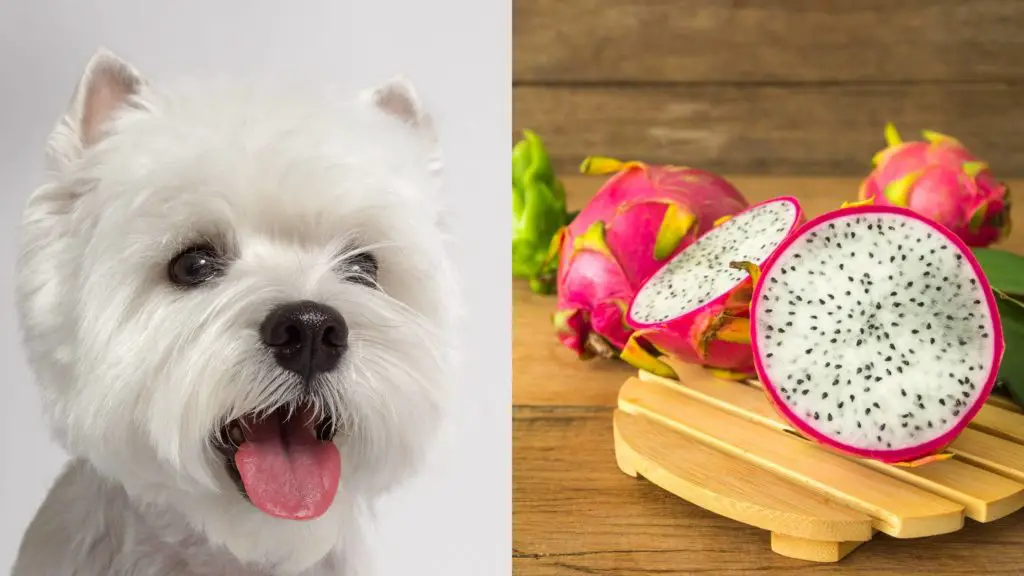
Health benefits of dragon fruit for dogs
A dragon fruit is low in fat and calories, making it a healthy snack choice for both humans and dogs. You won’t need to worry about your pet gaining weight and you know that he will be benefiting from all the vitamins and minerals it contains.
Your pup will also gain the following health benefits from consuming this tropical fruit.
Bone and teeth development – calcium is essential for the development of your pup’s bones and teeth, and dragon fruit is bursting with this important nutrient.
Staying hydrated – dragon fruit is made up of approximately 90% water, making a great way to keep your pup’s moisture levels up. Giving your dog dragon fruit in the summer months will help ensure he stays hydrated.
Boosts a dog’s immune system – the high levels of vitamin C and antioxidants found in dragon fruit help to strengthen your canine’s immune system, contributing to good overall health and reducing the risk of infections, diabetes and some types of cancer.

Regulates blood sugar and lowers cholesterol – dragon fruit contains fiber that can help to lower a dog’s cholesterol levels.
Supports joint functions – the seeds of a dragon fruit contain fatty acids such as linoleic acid and omega-6s, both of which help maintain healthy joints, skin, hair and brain.
Protects cells from aging and damage – a dragon fruit contains antioxidants that protect your dog from oxidation, the damage caused by free radicals. If free radicals are not removed from your dog’s body safely then can cause health problems such as arthritis or joint problems.
Helps fight cancer – dragon fruit contains flavonoids and betacyanin which are known for containing cancer fighting agents. The metabolites protect cells from free radical damage, fighting cancer and the signs of premature aging.
Prevents anemia – the minerals in dragon fruit help hemoglobin to transport oxygen in the blood, ensuring the right amount is supplied to your dog’s organs. This gives your dog the energy they need and prevents anemia.
Promotes regular bowel movements – the fiber in dragon fruit not only helps ensure your pup’s bowel movements are regular, it can also lower cholesterol and regulate blood sugar levels.
Is dragon fruit bad for dogs?
No, dragon fruit is not poisonous to canines, however eating too much dragon fruit could cause health problems such as:
• Tooth decay – sugar is the main cause of tooth decay in pups. Dragon fruit sticks to a dog’s teeth, which can lead to tooth decay if eaten regularly.
• Obesity – as with humans, too much sugar can cause weight issues and obesity. Overweight dogs are at an increased risk of arthritis, back problems, breathing difficulties and even some types of cancer.
• Stomach irritation – excessive levels of sugar can lead to gut irritation where a dog’s intestines are trying to process large amounts of sugar.
• Depilation – too much sugar in a dog’s diet can also cause hair or fur loss. Excessive amounts of sugar in a canine’s diet has also been known to affect metabolism, growth and a dog’s temperament.
How to prepare dragon fruit for your pup?
When introducing new foods to your pet, you should do so cautiously and never force your dog to eat something he doesn’t want to. Let him have a sniff and explore this unique fruit with his senses first.
Here’s how to prepare a dragon fruit safely for dogs to eat.
1. Remove the leathery skin. You should avoid feeding your dog dragon fruit skin because it’s tough and will be difficult for your furry friend to digest. Canines often don’t chew their food either, which means dragon fruit skin could easily get stuck in a dog’s throat.
2. Slice the flesh of the dragon fruit into small bite sized pieces. You could also mash up the fruit and add it as a topping on top of your dog’s usual food or give it to him directly from a spoon.
In the summer months, try freezing slices of dragon fruit to help your dog cool down when he’s hot.
As with all new foods, monitor your dog closely for any signs of a reaction after he has eaten dragon fruit. There’s a chance that dragon fruit could cause your canine friend to have an upset stomach. If this happens, don’t give him any more. If you’re concerned that your dog is behaving out of character or showing signs of an allergic reaction, contact your veterinarian immediately.
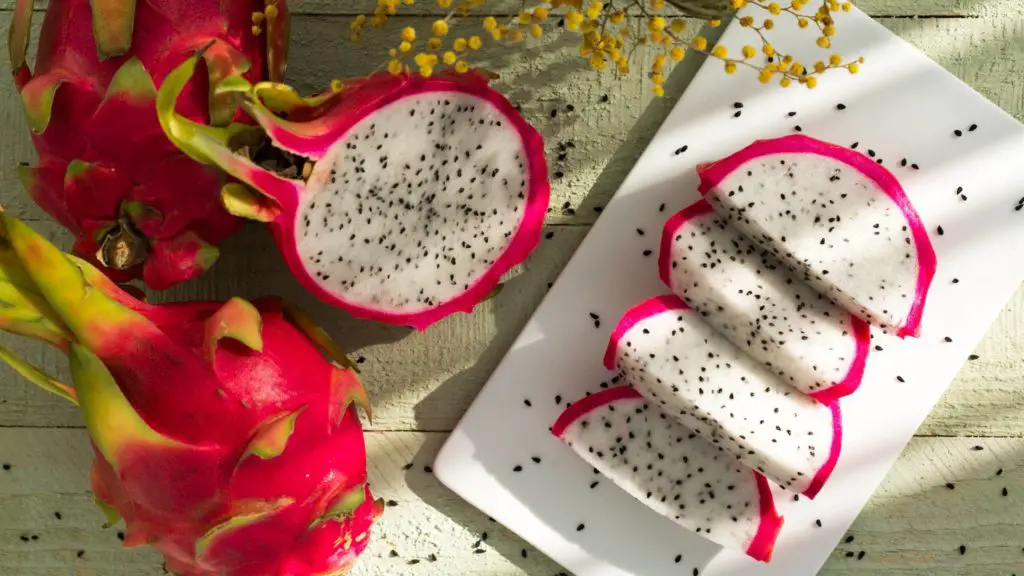
Can dogs eat dried dragon fruit?
Whether dogs can eat dried dragon fruit will depend on how the fruit is dried. Dried fruit usually contains added flavors, preservatives and sugar that could be unhealthy or even toxic to your pup.
What fruit cannot be eaten by dogs?
Fruit plays such an essential part of our diet that it’s normal to want to share something that tastes good and is healthy with our pets. However, before letting your pooch dive into your fruit bowl, it’s important to know which fruits are safe for canines and which ones could cause them harm.
Fruits dogs should avoid:
Avacado – whilst this fruit is a healthy snack for dog owners, it should not be given to dogs to eat. The skin, pit of an avocado contains a toxin called persin that can cause vomiting and diarrhea in canines.
Cherries – cyanide is found in cherries which is highly toxic to dogs. Cyanide prevents effective oxygen transportation around the body, which means your dog’s blood cells are unable to get enough oxygen. Symptoms of cyanide poisoning in dogs include difficulty breathing, dilated pupils and red gums. Even a small amount of cyanide can cause fatalities and cyanide poisoning should be treated as a medical emergency. The seeds of a cherry can also cause an obstruction in the gastrointestinal tract.
Grapes – never feed grapes or raisins to your dog because they contain a toxic chemical that can cause sudden kidney failure in canines.

Grapefruit – The rind of grapefruit is toxic to dogs and the flesh is extremely acidic, which can cause digestive issues.
Lemon – some citrus fruits such as lemons can cause digestive problems. The high levels of citric acid in lemons could also make your pup sick.
Lime – Just like lemons, limes contain dangerous levels of citric acid and should not be consumed by dogs.
Plums – The pit of a plum has been known to cause bowel blockages in dogs.
Rhubarb – the toxins found in rhubarb can cause damage to your dog’s nervous system, kidneys and digestive system.
Tomatoes – whilst dogs can safely eat ripe tomatoes, unripe tomatoes should be avoided because they contain solanine and tomatine that are highly toxic to some animals, including canines.
Fruits that are safe for dogs, in moderation:
Apple – pitted and cored apples are a safe source of vitamins A and C for dogs. This fruit is even believed to help keep a pup’s teeth clean and freshen their breath.
Banana – bananas contain potassium and are considered a safe fruit for dogs to eat. Be mindful that they have high levels of sugar so should only be given occasionally.
Blueberries – Packed full of antioxidants, fiber and vitamins C and K, blueberries are a dog-safe fruit that helps to support the immune system.
Blackberries – the antioxidants in blackberries can help to fight free radicals found in your dog’s body.
Cranberries – Vitamin C, fiber, potassium in cranberries can benefit your dog’s health and even fight inflammation.
Mango – dogs are known to love mango, and for good reason. Vitamins A, B6, C and E are all found in this tropical fruit.
Pear – pear contains copper, fiber and vitamins C and K and can be given safely to dogs if the pit and seeds are removed first.
Pineapple – the flesh of a pineapple contains several vitamins, minerals and fiber that can benefit a dog’s overall health.
Pumpkin – the pulp and seeds in pumpkins are safe for doggy consumption. The high levels of fiber it contains make it an effective remedy for diarrhea or constipation.

Raspberries – raspberries make a tasty treat for your dog that’s full of antioxidants, manganese, fiber and vitamin C.
Strawberries – high in antioxidants, fiber and vitamin C, strawberries make a healthy snack choice for pups. Be careful not to overindulge your dog with too many strawberries though because the high levels of sugar can make them unhealthy.
Oranges – the fleshy part of an orange contains vitamin C and is safe for dogs to eat, but the skin, pith and seeds may contain toxins and should be avoided.
All fruit should be cut up into small bite-sized pieces to avoid becoming a choking hazard.
Dragon fruit and dogs
To summarise, you can safely enjoy dragon fruits with your pup occasionally and feel good that as a pet owner you are giving your dog lots of health benefits. It’s likely that your pooch will get just as excited as you about seeing a bright, interesting looking food on the table. Before serving, here are the top things to remember:
• Always remove the tough leathery skin but the dragon fruit seeds are safe to leave in before serving.
• Only give your dog dragon fruit in small amounts (no more than one or two spoons at a time).
• If your dog gets diarrhea from eating dragon fruit, don’t give him anymore.
Looking for More Great Articles About What Your Dog Can (or Can’t) Eat?
- Can Dogs Eat Pizza Rolls? Everything You Need to Know
- Can Dogs Eat Orange Chicken? Is it Safe?
- Can Dogs Eat Cotton Candy? Is it Safe?
- Can Dogs Eat Cooked Cow Tongue? Everything You Need to Know
Reference list
- VCA Hospitals “antioxidants in dogs” https://vcahospitals.com/know-your-pet/antioxidants Accessed 24th October 2021
- PDSA “safe fruits for dogs” https://www.pdsa.org.uk/pet-help-and-advice/looking-after-your-pet/puppies-dogs/safe-fruit-and-veg-for-dogs Accessed 24th October 2021
- PET MD “dangers of stone fruits for dogs” https://www.petmd.com/dog/general-health/6-dangers-stone-fruits-dogs Accessed 24th October 2021
- Purina “can dogs eat tomatoes” https://www.purina.co.uk/articles/dogs/feeding/what-dogs-eat/can-dogs-eat-tomatoes Accessed 24th October 2021
- VCA hospitals “dental disease in dogs” https://vcahospitals.com/know-your-pet/dental-disease-in-dogs Accessed 24th October 2021

